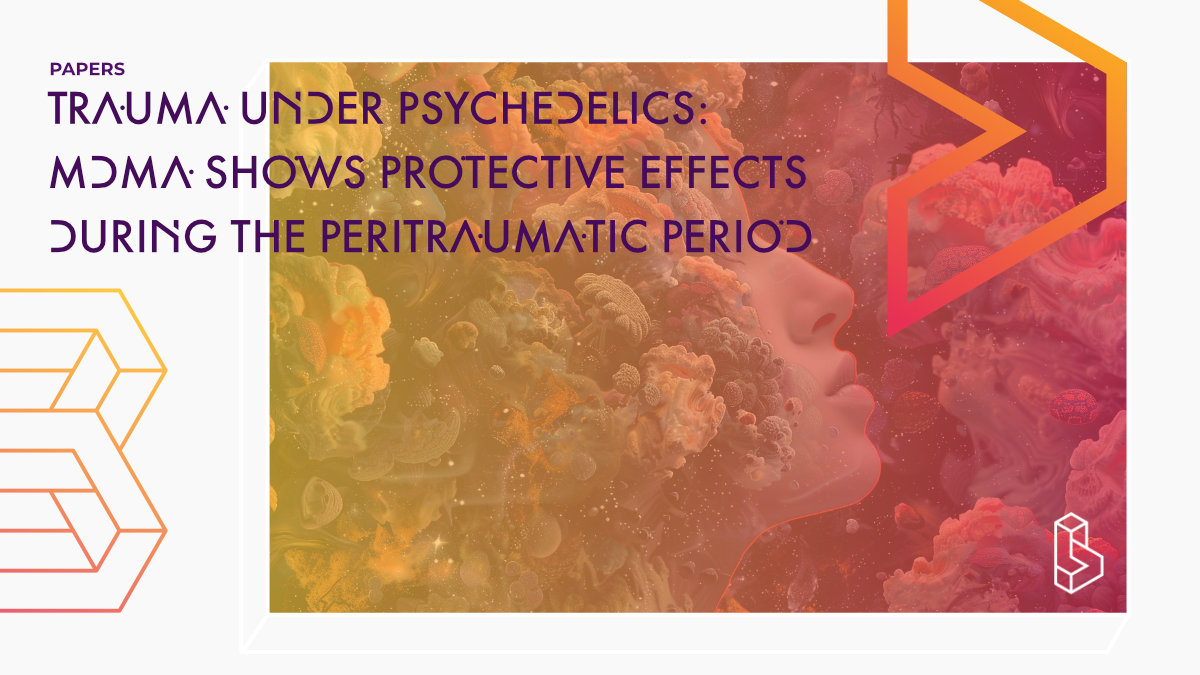This pre-print retrospective cohort study (n=657) examines the acute experiences and peritraumatic processing of survivors from a high-casualty terror attack, with approximately two-thirds under the influence of psychoactive substances. Those who experienced the trauma under MDMA showed improved intermediate outcomes, including increased social support, more interactions, and better sleep quality, leading to reduced mental distress and PTSD symptom severity. These findings suggest a potential protective effect of MDMA during trauma.
Abstract of Trauma Under Psychedelics: MDMA Shows Protective Effects During the Peritraumatic Period
“Traumatic events (TEs) play a causal role in the etiology of psychopathologies such as depression and posttraumatic stress disorder (PTSD). Recent research has highlighted the therapeutic potential of psychoactive substances and especially 3,4-methylenedioxymethamphetamine (MDMA), in alleviating trauma symptoms in chronic patients. However, little is known regarding the consequences of trauma that is acutely experienced under the influence of psychoactive substances. Here we investigated the acute experiences and peritraumatic processing of 657 survivors from the high-casualty terror attack at the Supernova music festival in Israel on October 7th, 2023. Data were collected four to twelve weeks following the TE. Approximately two-thirds of survivors were under the influence of psychoactive substances at the time of the TE, offering a tragic and unique natural experiment on the impact of psychoactive compounds on TE processing. Our findings reveal that individuals who experienced the trauma while under the influence of MDMA demonstrated significantly improved intermediate outcomes compared to those who were under the influence of other substances or no substances at all. Specifically, the MDMA group reported increased feelings of social support, more social interactions and enhanced quality of sleep during the peritraumatic period, yielding reduced levels of mental distress and reduced PTSD symptom severity. These novel findings suggest that the influence of MDMA during the TE may carry protective effects into the peritraumatic period, possibly mediated through the known effects of MDMA in reducing negative emotions and elevating prosociality. These protective effects in turn may mitigate the development of early psychopathology-related symptoms. Current preliminary results underscore the need for further understanding of the cognitive and physiological processes by which psychedelic substances intersect with trauma recovery processes.”
Authors: Ophir Netzer, Noa Magal, Yonatan Stern, Tzuk Polinsky, Raz Gross, Roee Admon & Roy Salomon
Summary of Trauma Under Psychedelics: MDMA Shows Protective Effects During the Peritraumatic Period
Introduction
Traumatic events can cause acute physiological, cognitive, and emotional responses. MDMA assisted psychotherapy has shown impressive efficacy in the treatment of chronic PTSD, though the exact mechanisms through which its psychopharmacological effects yield increased therapeutic effectiveness are not entirely clear. The Supernova music festival in 2023 was one of the main targets of a surprise large-scale terror attack launched on Israel. Many festival attendees were under the influence of mind-altering psychoactive substances during the attack.
Netzer et al. investigated 657 survivors of the Supernova music festival for their experience and processing of trauma under psychedelics, and collected data regarding mental distress and PTSD symptom severity during the peritraumatic period.
Find this paper
Trauma Under Psychedelics: MDMA Shows Protective Effects During the Peritraumatic Period
https://doi.org/10.1101/2024.03.28.587237
Open Access | Google Scholar | Backup | 🕊
Cite this paper (APA)
Netzer, O., Magal, N., Stern, Y., Polinsky, T., Gross, R., Admon, R., & Salomon, R. (2024). Trauma Under Psychedelics: MDMA Shows Protective Effects During the Peritraumatic Period. bioRxiv, 2024-03.

